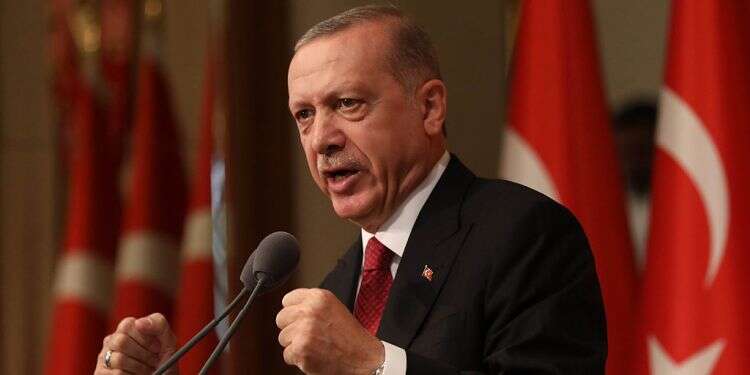Defense Minister Benny Gantz accused Turkey on Sunday of destabilizing the region and working against peacemaking efforts, calling for international pressure to bring about a change in the NATO member's conduct.
Briefing Persian Gulf reporters as a follow-up to Israel's founding of ties with the United Arab Emirates and Bahrain, Gantz described Turkey and Iran as "denying promotion of peace and supporting regional aggression."
Follow Israel Hayom on Facebook and Twitter
Iran – Israel's chief enemy – and Turkey have criticized the US-brokered Sept. 15 normalization deal between Israel and the Gulf powers, seeing a betrayal of the Palestinian cause.
Citing Turkey's actions in northern Syria and the Eastern Mediterranean, as well as its Libya intervention and contacts with Palestinian Hamas militants, Gantz said: "All of this pushes away from stability."

"The question of Turkey is a very complicated one because Turkey is part of NATO," Gantz told the Zoom conference, organized by the Arab Council for Regional Integration, a group that encourages Israeli-Arab outreach.
"So we must take all the options that we have in our hands and try to influence it through international pressure to make sure that they are pulling their hands from direct terrorism."
The Palestinians have been dismayed by Israel's diplomatic inroads in the Gulf, which side-step long-stalled talks on their statehood goal in the Israeli-occupied West Bank and in Gaza.
Israel, like the United States, has argued that the deals with the UAE and Bahrain could usher in a Palestine deal, too.
"We just want to make sure that we find the right balance between maintaining our security and enabling Palestinian sovereignty," Gantz said.
Gantz stressed that "the normalization agreements strengthen the fight against Iran. ... We have shared interests. We all share the battle against the Iranian aggression and its nuclear development which jeopardizes the region and the world, and we'll establish a united front against it."
On the Lebanese front – in which tensions with Jerusalem have escalated in recent months – Gantz said that if war broke out, it would be difficult to operate without causing harm to civilians as "in Lebanon there are houses with a guest room and a missile room."
Meanwhile, the head of Saudi Arabia's Chambers of Commerce has called for a boycott of Turkish products amid reports from merchants that animosity between Ankara and Riyadh is hindering the flow of goods between the two regional powers.
Saudi Arabia and Turkey have been at odds for some years over foreign policy and attitudes towards political Islamist groups. The murder of Saudi journalist Jamal Khashoggi in Saudi's Istanbul consulate in 2018 escalated tensions sharply.
Earlier this year the two countries blocked some of each other's news websites.
"A boycott of everything Turkish, be it imports, investment or tourism, is the responsibility of every Saudi 'trader and consumer', in response to the continued hostility of the Turkish government against our leadership, country and citizens," businessman Ajlan al-Ajlan tweeted on Saturday.
The Saudi Chambers of Commerce is a nongovernment group of private sector business people. The Saudi government's communications office did not immediately respond to a request for comment.
Subscribe to Israel Hayom's daily newsletter and never miss our top stories!
For over a year, some Saudi and Turkish traders have speculated that Saudi Arabia was enacting an informal boycott of imports from Turkey.
One Saudi importer said that containers he imported this year from Turkey lay for three months with customs before being released. He said customs officials informally advised him not to import directly from Turkey again.
Turkish opposition lawmaker Mehmet Güzelmansur said last week that goods, in particular perishable fruit and vegetables, exported from his region of Hatay are held at the Saudi border for longer than necessary on arrival.
i24NEWS contributed to this report.




